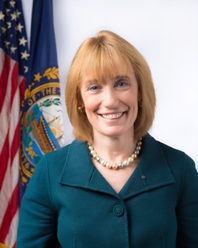Will New Hampshire Split Its Vote in 2016?
In only eight of 16 cycles over the last 100 years has a party run the table in Granite State Presidential, U.S. Senate, and gubernatorial races; Democrats have only pulled off this political hat trick once

That race is poised to be a dead heat, but, as a result of Hassan seeking a seat in D.C., the state’s gubernatorial race is now wide open and puts the Democratic Party’s six-cycle winning streak in jeopardy.
Meanwhile, the Granite State is expected to once again be one of a handful of battleground states at the top of the ticket in the presidential race.
And so, when all the votes are counted on November 8th, what are the chances one party will sweep all three high profile – and likely competitive – elections in the state?
Smart Politics examined the 16 election cycles over the last century in which New Hampshire hosted U.S. Senate and gubernatorial contests in a presidential election year and found that one party swept all three races in the state just eight times with Democrats doing so just once.
The idea that New Hampshire voters might split their ticket in 2016 should not come as a surprise.
For starters, each of these three races has the potential to be very closely decided in this battleground state, so there is little guarantee that the party which prevails at the top of the ticket will sweep the other two contests down the ballot.
Secondly, Granite State residents have split their vote for president and U.S. Senate in seven out of 16 cycles since the start of direct elections for the nation’s upper legislative chamber, or 43.8 percent of the time.
That is tied with Arkansas for the seventh highest rate of split-ticket voting in the nation for those two offices, behind only Montana (55.4 percent), North Dakota (52.9 percent), Oregon (47.4 percent), Rhode Island (47.1 percent), and Missouri and Louisiana (44.1 percent).
New Hampshire has also split its vote in U.S. Senate and gubernatorial races in nine of the last 18 cycles dating back to 1962 (although just 10 of 34 cycles since 1914).
During the last 100 years, Granite State voters have also split their ticket in presidential and gubernatorial elections in seven of 25 cycles, or 28 percent of the time.
Taken as a whole, there have been 16 election cycles in which New Hampshire has had presidential, gubernatorial, and U.S. Senate races all on the same ballot – and only in half of them did one party sweep all three races:
- 1920 (Republican): Warren Harding (p), Albert Brown (g), George Moses (s)
- 1924 (Republican): Calvin Coolidge (p), John Winant (g), Henry Keyes (s)
- 1948 (Republican): Thomas Dewey (p), Sherman Adams (g), Styles Bridges (s)
- 1956 (Republican): Dwight Eisenhower (p), Lane Dwinell (g), Norris Cotton (s)
- 1960 (Republican): Richard Nixon (p), Wesley Powell (g), Styles Bridges (s)
- 1968 (Republican): Richard Nixon (p), Walter Peterson (g), Norris Cotton (s)
- 1984 (Republican): Ronald Reagan (p), John Sununu (g), Gordon Humphrey (s)
- 2008 (Democrat): Barack Obama (p), John Lynch (g), Jeanne Shaheen (s)
The 2008 cycle is the only time Democrats have swept all three offices at the ballot box in state history.
In fact, before the direct election of U.S. Senators in 1914, the state voted for both Democratic presidential and gubernatorial nominees only once since the founding of the Republican Party in the mid-1850s (1912, for Woodrow Wilson and Samuel Felker).
Meanwhile, New Hampshire has split its ticket for these three high profile offices eight times, including five of the last seven times all three offices have been on the ballot since 1972:
- 1932: Republican – Hoover (p) and John Winant (g); Democrat – Fred Brown (s)
- 1936: Democrat – Franklin Roosevelt (p); Republican – Francis Murphy (g) and Styles Bridges (s)
- 1944: Democrat – Franklin Roosevelt (p); Republican – Charles Dale (g) and Charles Tobey (s)
- 1972: Republican – Richard Nixon (p) and Mel Thomson (g); Democrat – Thomas McIntyre (s)
- 1980: Republican – Ronald Regan (p) and Warren Rudman (s); Democrat – Hugh Gallen (g)
- 1992: Democrat – Bill Clinton (p); Republican – Steve Merrill (g) and Judd Gregg (s)
- 1996: Democrat – Bill Clinton (p) and Jeanne Shaheen (g); Republican – Bob Smith (s)
- 2004: Democrat – John Kerry (p) and John Lynch (g); Republican – Judd Gregg (s)
While Ayotte and Hassan have effectively sealed their place as their party’s respective nominees in the U.S. Senate contest, the Democratic race for governor is wide open to take on GOP frontrunner Chris Sununu.
Follow Smart Politics on Twitter.

Given recent trends (since 1995, Year One of the Counterrevolution against the Gingrich-led, Dixieland-flavoured Republican Revolution), should Senator “NRAyotte” end up losing to outgoing 2-term Governor Hassan, it is more likely than not the Ds will run the (presidential-gubernatorial-USSenate) table, and even attain majorities in the Executive Council and both legislative chambers to boot (I for one do not foresee the Rs sweeping the board, with or without the “New (would-be) Furor” atop his newly-adopted party’s ticket).
Is/was there 2 different JOHN WINANTs, one who was elected “Governor” alongside “Silent Cal” in 1924, and one who was elected “Senator” while being on the same ticket with Hoover in ’32?
I believe Winant was the first Granite State GOV to win more than one two-year term (1924, 1930, 1932 – he lost reelection in 1926 in the primary). 1932’s US SEN nominee for the GOP was three-term incumbent George Moses, who narrowly lost to former GOV Fred Brown.